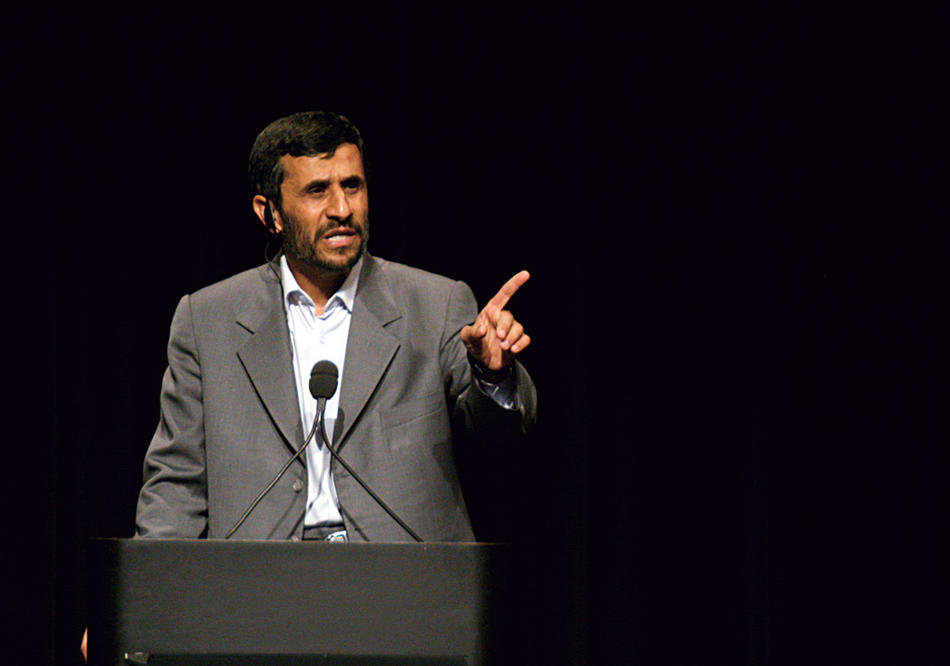September 24, 2007, was a busy day for free speech on campus. Students of opposing political viewpoints organized and participated in peaceful rallies; the eternal questions surrounding the competing rights of speakers and listeners were vigorously debated; Lee C. Bollinger demonstrated that free speech includes the right to level harsh personal criticism at one's guest (thus generating more debate); and the University, still smarting from last year's Minuteman controversy, reaffirmed its role as a forum where even the most disagreeable speakers can expose their ideas to scrutiny.
"I'm very proud of my school right now," said Jivan Kurinec '09SEAS, who watched the 90-minute presentation inside Roone Arledge Auditorium. "We gave Ahmadinejad the respect to speak, and that speaks volumes about our character."
Not since Fidel Castro landed at Princeton in April 1959 had the visit of a foreign head of state to an American university caused such excitation. By 11:00 a.m., the Morningside campus was buzzing with a surreal carnival-like atmosphere that barely masked the tension over what some feared would be a deeply divisive event. Under an intense blue sky, students gathered on the Low Library steps and along College Walk carrying signs and banners that reflected the variety of strong opinions on campus. On the windows of Lerner Hall and elsewhere, photocopied images depicting hangings of gays and unchaste women in Iran were posted alongside handwritten messages espousing Iran's expressions of sympathy toward the U.S. after September 11 and its tolerance toward its significant Jewish population. For many students, personal objections to Ahmadinejad's religious fundamentalism and antiliberal policies were secondary to concerns that his vilification would increase the risk of a war with Iran.
Out on Broadway, barricades and satellite trucks lined the street for blocks, and at the gates at 116th Street a crowd of impassioned anti-Ahmadinejad protesters decried the University's decision to provide a legitimate platform to a man who threatens Israel, funds terrorist groups like Hezbollah, and questions the Holocaust. Inside the gates, which were secured by campus police, thousands of students packed South Lawn, where a giant video monitor had been set up to carry the speech live.
While Castro was a charismatic figure who knew how to play to the American media, Ahmadinejad proved less dexterous. He parried Bollinger's provocative introduction with a gentle lecture on basic courtesy, and won some applause by accusing the U.S. of hypocrisy and double standards with regard to nuclear power, terrorist labeling, military aggression, and the plight of the Palestinians. But when asked during the question-and-answer period about the executions of homosexuals in Iran, Ahmadinejad replied through an interpreter that, "In Iran, we don't have homosexuals like in your country."
The remark drew derisive laughter and boos from much of the audience and became the most talked-about of all his quotes. Some students felt that this denial of fact did more to discredit Ahmadinejad than anything else, validating the notion that free speech, among its other virtues, permits an objectionable speaker to hang himself with his own words. Afterward, Sarah Brafman '10CC called Ahmadinejad's speech an "incoherent rant" and "educationally not valuable," but felt that the University did the right thing in letting him speak. "We have to be the bigger people," she said, adding that she would like to visit Iran to see the country for herself.
Michael Schwartz '09GS, who opposed the University's decision to have Ahmadinejad speak, seemed satisfied that no great damage had been done.
"All Ahmadinejad really accomplished was to create a lot of activism," Schwartz said. "It will only hurt his cause."



